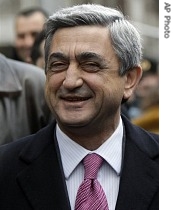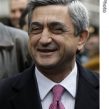
ARMENIA IN TURMOIL AFTER PRESIDENTIAL ELECTION PRAISED BY WEST
Publication: Eurasia Daily Monitor Volume: 5 Issue: 36
By:

Armenia is facing its most serious political crisis in years in the wake of the February 19 presidential election that was controversially won by Prime Minister Serge Sarkisian. Tens of thousands of supporters of his main challenger, former president Levon Ter-Petrosian, have been holding daily rallies in Yerevan to protest against what they see as massive vote rigging and to demand a re-run of the vote. The Armenian authorities have responded to the protests by arresting at least three opposition leaders and threatening to use force against the demonstrators.
According to the official vote results released by the government-controlled Central Election Commission (CEC) on February 24, Sarkisian won 52.8% of the vote, enough to avoid a risky run-off with Ter-Petrosian. The latter was shown winning only 21.5%, followed by two other major candidates, former parliament speaker Artur Baghdasarian (16.7%) and Vahan Hovannisian (6.1%) of the pro-establishment Armenian Revolutionary Federation (ARF). Of the three Sarkisian challengers only Hovannisian conceded defeat, resigning as deputy speaker of the Armenian parliament. But even he called the election deeply flawed.
The record-high voter turnout of 70% reported by the CEC is enough to raise questions about the credibility of the official results. With a large part of Armenia’s 2.3 million eligible voters living abroad and therefore unable to vote, the figure means that at least 80% and possibly 90% of the country’s adult population went to the polls on February 19. This was clearly not the case.
It was arguably the most violent election ever held in Armenia, with dozens of Ter-Petrosian proxies reportedly beaten and even kidnapped on polling day. There were also reports of widespread ballot box stuffing and vote buying. As was the case during previous Armenian elections, busloads of bribed voters could be seen outside many polling stations in Yerevan and other parts of the country. Many of them were reportedly provided with false documents to cast multiple ballots for Sarkisian. An RFE/RL reporter witnessed such a scene outside Sarkisian’s campaign office in Yerevan’s Zeytun district (RFE/RL Armenia Report, February 19).
More evidence of fraud emerged during ballot recounts in some of Armenia’s more than 1,900 electoral precincts. Sarkisian was found to have received fewer votes there than were reported by the local election commissions. It is little wonder that the CEC made sure that the recounts are not conducted nationwide. There were also glaring discrepancies between some precinct-level vote protocols and figures contained in the CEC vote tally.
Yet if one is to believe Western observers representing the OSCE, the Council of Europe, and the European Union, the Armenian authorities administered the presidential ballot “mostly in accordance” with democratic standards. In their preliminary report issued on February 20, the observers said they found no major violation in “a large majority” of polling stations visited by them. The report noted at the same time “a lack of public confidence in the electoral process.” It did not explain why a supposedly democratic election would generate such popular sentiment and be seen as fraudulent not only by the Armenian opposition but also by much of civil society.
The observers’ findings, which have been endorsed by the European Union and the United States, essentially legitimize the transfer of power from outgoing President Robert Kocharian to his longtime chief lieutenant in the eyes of the international community. The West and the United States in particular are clearly unwilling to undercut Armenia’s two top leaders, who seem to have agreed to a resolution of the Karabakh conflict proposed by the U.S., French, and Russian mediators. During their most recent trip to Yerevan and Baku in January, the three co-chairs of the OSCE Minsk Group came away from their talks with Kocharian quite satisfied. (Ironically, Kocharian and Sarkisian had forced Ter-Petrosian to step down in 1998 for advocating essentially the same peace deal.)
For many Armenians, that is not sufficient grounds for accepting the legitimacy of a leader whom they did not elect. Tens of thousands of them have been rallying in Yerevan’s Liberty Square on a daily basis to back Ter-Petrosian’s demands for a repeat election. The most diehard supporters of the ex-president set up a tent camp in the square on February 20 and have since been holding overnight vigils there in scenes reminiscent of Ukraine’s Western-backed Orange Revolution. Ter-Petrosian, who has pledged to “fight to the end,” hopes that the popular pressure will grow in the coming days and force the ruling regime to cave in.
In the first sign of cracks emerging within the regime, Armenia’s Deputy Prosecutor-General Gagik Jahangirian delivered a fiery speech at Liberty Square on February 22 and called Ter-Petrosian the rightful winner of the presidential ballot. Also alleging election fraud and voicing support for the former president were ten senior Armenian diplomats, including Deputy Foreign Minister Arman Bayburtian and Armenia’s ambassadors to Italy and Kazakhstan.
Jahangirian, Bayburtian, and both ambassadors quickly lost their jobs as Kocharian and Sarkisian went on a counteroffensive on February 23, calling the opposition actions a coup attempt in emergency meetings with top army generals and police and National Security Service officials. Kocharian was quoted by his office as ordering them to take “drastic” measures to restore “law and order” in the country (Statements by the presidential press service, February 23). That was followed by the weekend arrests of Jahangirian and two other top Ter-Petrosian allies. Kocharian also issued a stern warning to Manvel Grigorian, a top army general and deputy defense minister whose Yerkrapah Union of Armenian veterans of the Karabakh war has pledged allegiance to the former president.
Ter-Petrosian appears to be undaunted by these developments, joking and dancing with his loyalists spending their nights in Liberty Square. Ter-Petrosian assured the 30,000 that had gathered there on January 24 that Kocharian and Sarkisian are “not crazy” enough to use force against them. The 63-year-old former scholar, who made a dramatic political comeback last September after an almost decade of silence, had already come to power on the back of the 1988 popular movement for Karabakh’s unification with Armenia. Whether he can bring down a stronger and more ruthless regime should be clear in the coming days.




